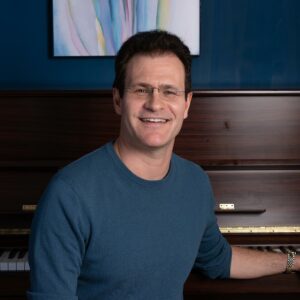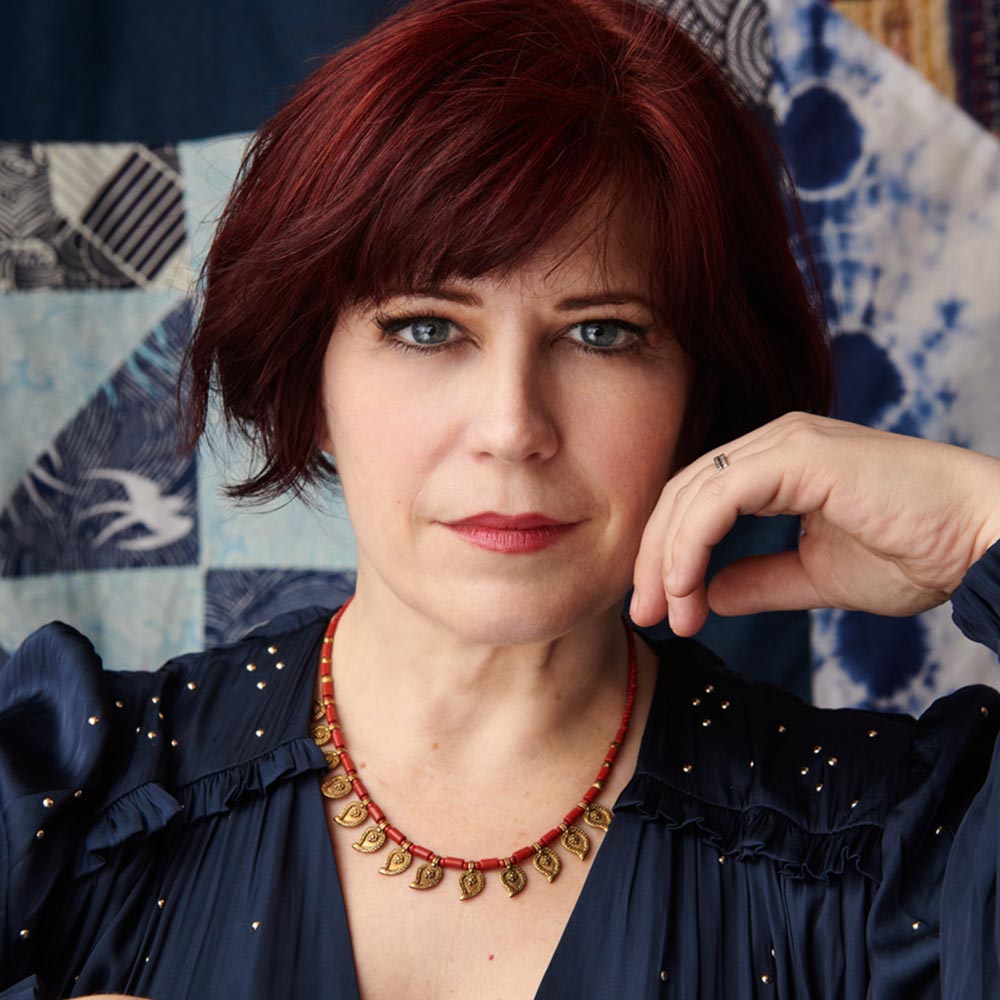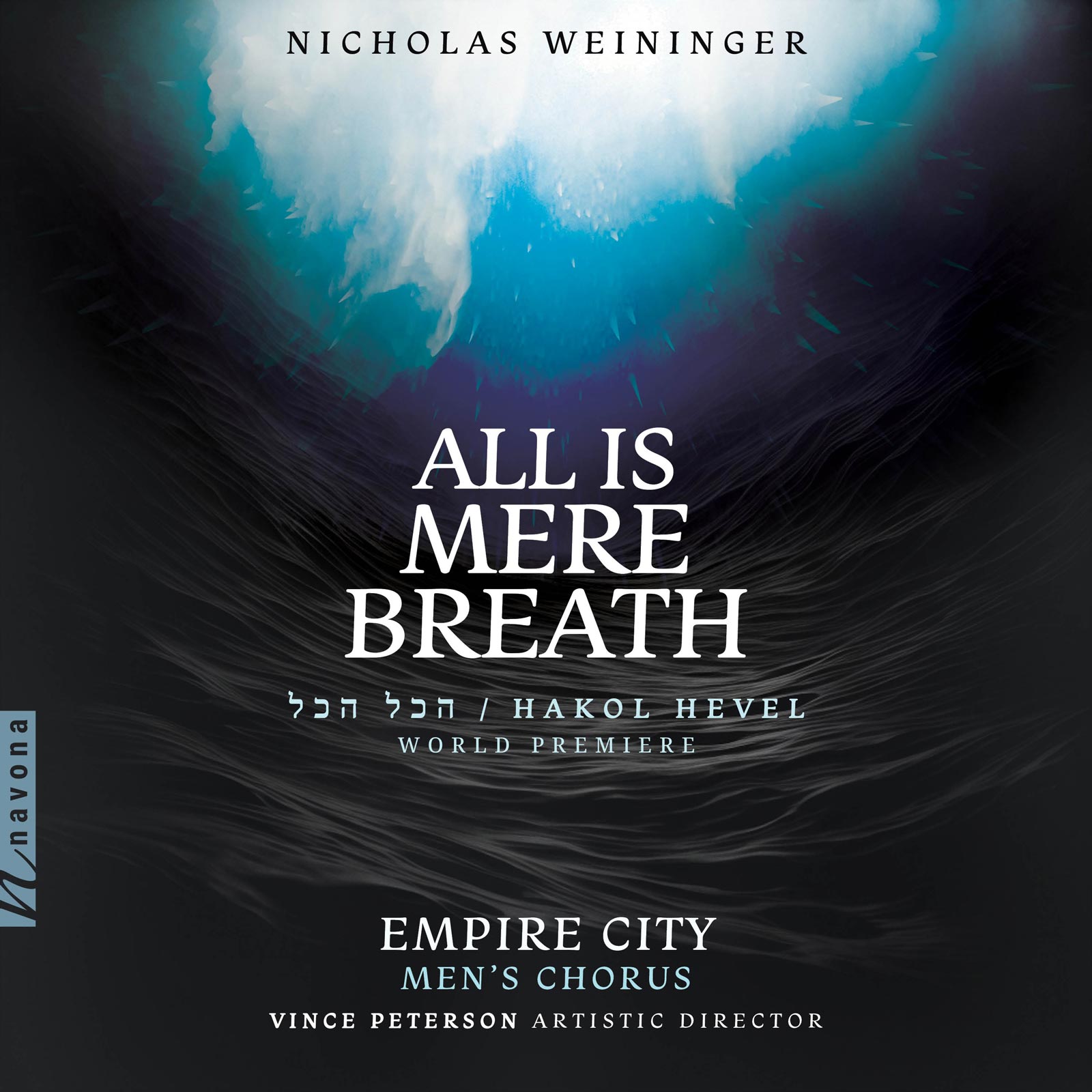All Is Mere Breath
Nicholas Weininger composer
Empire City Men’s Chorus
Vince Peterson artistic director
“Havel havalim hakol hevel,” — “Merest breath, all is mere breath.”
In the throes of lockdown, Nicholas Weininger found himself reflecting on this Hebrew verse; what is the nature of our collective life sustained on if not breath and breath alone? It was a breath robbed and convoluted during the COVID-19 pandemic: the ravaged breath of the afflicted, the fear of coming too close to the breath of another. Our world seemed to pause and take a breath, busy city streets gone barren amid our collective anxieties.
Debuted and recorded by the Empire City Men’s Chorus, ALL IS MERE BREATH asks us to question the nature of our changed society in the thought of mere breath alone, and offers us refuge in the breath of song, perhaps, now and then, the purest form of it.
Listen
Stream/Buy
Choose your platform
Track Listing & Credits
| # | Title | Composer | Performer | |
|---|---|---|---|---|
| 01 | Hakol Hevel (All Is Mere Breath): I. Overture | Nicholas Weininger | Empire City Men's Chorus | 2:03 |
| 02 | Hakol Hevel (All Is Mere Breath): II. How she sits alone | Nicholas Weininger | Empire City Men's Chorus | 8:47 |
| 03 | Hakol Hevel (All Is Mere Breath): III. The words of Qohelet | Nicholas Weininger | Empire City Men's Chorus | 7:21 |
| 04 | Hakol Hevel (All Is Mere Breath): IV. Like foxes among the ruins | Nicholas Weininger | Empire City Men's Chorus | 6:20 |
| 05 | Hakol Hevel (All Is Mere Breath): V. My God, my God | Nicholas Weininger | Empire City Men's Chorus | 3:36 |
| 06 | Hakol Hevel (All Is Mere Breath): VI. Interlude - Turning | Nicholas Weininger | Empire City Men's Chorus | 1:23 |
| 07 | Hakol Hevel (All Is Mere Breath): VII. Look, my servant | Nicholas Weininger | Empire City Men's Chorus | 4:46 |
| 08 | Hakol Hevel (All Is Mere Breath): VIII. Send out your bread upon the waters | Nicholas Weininger | Empire City Men's Chorus | 4:16 |
| 09 | Hakol Hevel (All Is Mere Breath): IX. Hear this, you elders | Nicholas Weininger | Empire City Men's Chorus | 3:20 |
| 10 | Hakol Hevel (All Is Mere Breath): X. Coda - Oseh Shalom | Nicholas Weininger | Empire City Men's Chorus | 3:14 |
Recorded March 31, 2023 at Church of the Ascension, Greenpoint, Brooklyn NY
Engineers Wade Strange, Mike Clemow at SeeThruSound
Additional Editing and Mixing Melanie Montgomery
Mastering Melanie Montgomery
Executive Producer Bob Lord
A&R Director Brandon MacNeil
A&R Ivana Hauser
VP of Production Jan Košulič
Audio Director Lucas Paquette
VP, Design & Marketing Brett Picknell
Art Director Ryan Harrison
Design Edward A. Fleming
Publicity Chelsea Kornago
Artist Information

Nicholas Weininger
Nicholas Weininger (b. 1978) is a composer, singer, software engineering manager, and leadership coach. Weininger's works for a cappella chorus have been performed by ensembles across the United States, ranging from the International Orange Chorale of San Francisco and the NYC-based ensemble Choral Chameleon to the West Genesee High School Chorale, the Germantown Friends School Concert Choir, and the festival ensemble Coro Mundi. In March 2023, the Empire City Men's Chorus premiered his cantata Hakol Hevel (All is Mere Breath) for TTBB chorus, orchestra, and soloists. Weininger's works are published through Personage Press and ArrangeMe.

Empire City Men’s Chorus
Now celebrating 30 years, Empire City Men's Chorus (ECMC) has resounded with the heartbeat of humanity, transcending the realm of a traditional choral ensemble to become a transformative movement. From its founding in 1993 as The Gay Gotham Chorus, ECMC has remained dedicated to giving back to the LGBTQ community, initially supporting AIDS-related healthcare services and evolving to fearlessly confront the pressing challenges of New York City’s at-risk individuals, making a resounding impact in the greater community.

Vince Peterson
Vince Peterson is a respected choral conductor, composer/arranger, and teacher of music in the United States. His 20-year hybrid career spans the worlds of choral music, theater, sacred music, and music education. He has, however, established himself most prominently in the world of choral music, notably having founded the "shape-shifting" vocal ensemble Choral Chameleon in 2008. Across his work, he is responsible for presenting nearly 300 premieres of new choral and theater music in the last 15 years and has won critical acclaim in The New York Times, Time Out New York, The New York Concert Review, I Care If You Listen, The Examiner, and other publications. He is also a recipient of the prestigious ASCAP/Chorus America Award for Adventurous Programming.

Amy Buckley
Soprano Amy Buckley has graced opera, concert, and musical theater stages throughout the United States and Europe. A few of Buckley’s favorite roles include Adele (Die Fledermaus), Despina (Così fan Tutte), La Fée (Cendrillon), Susanna (Le nozze di Figaro), Marian (The Music Man), Mrs. Banks (Mary Poppins), Mary Sunshine (Chicago) and most recently Celeste #2 (Sunday in the Park with George).

Blythe Gaissert
Mezzo-soprano Blythe Gaissert has established herself as one of the preeminent interpreters of some of the brightest stars of new classical music. A true singing actress, she has received critical acclaim for her interpretations of both new and traditional repertoire in opera, concert, and chamber repertoire. “Gaissert gave a dramatically powerful, vocally stunning portrait of a woman growing increasingly desperate and delusional from lack of contact with the outer world. Gaissert’s development of Loats’s personality was utterly believable, and she gave a virtuoso performance of this very challenging music.” (Arlo McKinnon, Opera News on THE ECHO DRIFT).

Brian Mextorf
Praised for his “handsome, light tone” (New York Times) and “direct and easy rapport with the audience” (Culture Vulture), bass-baritone Brian Mextorf is in demand as a recitalist, concert singer, and ensemble performer. Following his Aids Quilt Songbook performance, Culture Vulture praised Mextorf’s “strong stage presence, direct and easy rapport with an audience, clear enunciation, and a firm understanding of the text and how to project it.”
Notes
In writing ALL IS MERE BREATH, I aim to express what I and many others felt during the pandemic and to connect those feelings to timeless human experiences. In May of 2020, cooped up at home, scared and frustrated, I was reading Robert Alter’s translation of the Tanakh, The Hebrew Bible, searching for verses that might relate to what we were going through, and the beginning of Lamentations stopped me cold:
“How she sits alone, the city once great with people.”
Surely that had to begin my response: surely there is no defter evocation of the sense of defeat and desolation that stalked us, the cold profusion of distanced mourning. New York, first and greatest among cities, sat alone, and all the others too, full only with wailing, united only in grief.
But though that verse started the piece, it couldn’t be the core. That initial shock of loneliness colored our pandemic experience but didn’t capture it fully. What might? I thought of the subtleties of translation that drew me to Alter’s great work, and of his commentary on Qohelet/Ecclesiastes. “Havel havalim hakol hevel,” says the Hebrew, and the King James Version renders it “Vanity of vanities, all is vanity.” But Alter says no, that’s wrong: it’s not about vanity in either the modern or archaic senses of that word. “Hevel” means “breath” and we should take that both literally, as a concrete image, and metaphorically to signify the ephemeral and transient. “Merest breath, all is mere breath.” The idea has echoes in many spiritual traditions — think of the importance of contemplating ephemerality, and of meditating on the breath, in Buddhism.
And it’s an idea never so resonant as now. All is mere breath: the threatening breath of others whose air we feared to share, the life-sustaining breath denied those whose lungs COVID ravaged. All is mere breath: the fragility of civilization, the pandemic exposed, our illusions of a firmly planned future canceled instantly. All is mere breath: the necessity of inwardness, of meditative contemplation, to keep us sane and calm in our monastic distance through an insane and turbulent time. All is mere breath: the thing every singer learns must come first, the origin and backbone of the song.
So in a time of ersatz virtual choirs I reflected on how a real choir might sing of the breath and its spiritual meanings, and how solo singers might declaim and cry out about what happened to us, what we might learn from it, how we might memorialize it. ALL IS MERE BREATH speaks not only to the hardship of the pandemic’s beginning, but to the ambiguity of its progress, the aching feeling that rescue is indefinitely far away, the tempering of episodes of deliverance with the knowledge that another surge might always happen, that “whatever comes is mere breath.” I hope it can serve as a document of those feelings and a solace to those who may come to know through it that they do not sit alone.
— Nicholas Weininger

